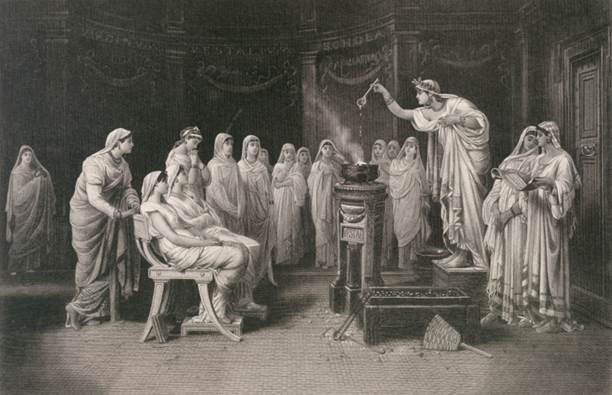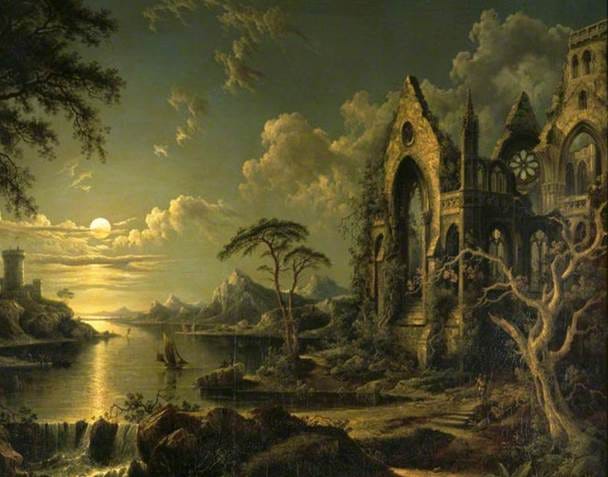The Decline of Christianity and the Crisis of the Republican State Religion
Ritualism and the search for meaning
This piece by Dr. David Engels is part of multi-part series, Rome Reloaded, exploring the striking parallels between ancient Roman society and our own. Enjoy!
Since its first political unification by Charlemagne, Europe has been, through and through, a Christian continent: its entire history can only be understood through the overwhelming influence of Christianity on all areas of civilization. And yet, Christianity appears to be sliding into irrelevance in the present day. Churches stand increasingly empty, holidays and traditions are losing their religious dimension, theology is devolving into bureaucracy, and seminaries are deserted.
At the same time, there is a growing, vague longing for meaning, which is expressed in many spiritual substitutes—not to mention the rise of Islam, which, at least in the cities of Europe, is shaping public space in a much more vibrant way than a Christianity that seems visible only through dead cultural relics.
This crisis, however, is not new. Already in late Rome, especially in the 1st century BC, the city experienced a similarly profound religious erosion, at the center of which was the traditional republican state religion. A comparison between these two eras reveals not only striking parallels, but also structural causes of religious decline — and possibly ways out of the crisis.
Reminder: To get our members-only content every week and support our mission, upgrade to a paid subscription for a few dollars per month. You’ll get:
Two full-length, new articles every single week
Access to the entire archive of useful knowledge that built the West
Get actionable principles from history to help navigate modernity
Support independent, educational content that reaches millions
The Republican Religion of Rome: Order Through Cult
Roman religion was a complex network of cult rituals, offices, sacrificial practices, and divine responsibilities. It served less to bring about personal salvation than to maintain the pax deorum — the divine peace that was supposed to guarantee order in the community. The pontifex maximus, the highest religious office, was as integral a part of the political system as the augurs, who interpreted the will of the gods by observing the flight of birds, and many others; almost all functions that we would today call higher “priestly offices” were held by senators and were determined by various republican electoral mechanisms. Religion and ritual were accordingly omnipresent: every election, every official act, every military activity was framed in religious terms.
But behind this outward splendor, the substance began to decay. Many citizens no longer knew how to perform a proper sacrifice, which festival was celebrated on which day, or the exact meaning of the phonetically chanted prayers in archaic Latin. The temples fell into disrepair, and politically secondary priestly offices remained vacant. The Roman religion had lost touch with the living reality of a people that had become multi-ethnic and cosmopolitan, no longer consisting of simple Latin farmers, and no longer grasping the rhythms of nature or the roots of Roman memory.
As the formal structure of worship became ever more obscure to the average citizen, so too did its relevance to the existential crises of daily life. In the midst of a vast globalist metropolis at the center of an empire that spanned the known world, the uprooted citizen, preoccupied only with bread and games, increasingly wanted only one thing: to understand the meaning of his own existence, which seemed completely insignificant in the context of the colossal Roman state machine. And while the old peasant and state religion became fossilized, increasingly exotic elements thus found their way into the spiritual imagination of the Romans, who until then had known no conversion, no inner emotion, no history of salvation, no personal relationship with the deity.
Rome had always pragmatically tolerated foreign gods and cults, or even imported them itself when it was politically expedient or seemed to be desired by the gods themselves. Now, however, a wide variety of Eastern cults invaded Rome in a short period of time. These cults were only partially assimilable and were based on concepts that seemed hardly compatible with the old mos maiorum, or “custom of the ancestors”. Some were persecuted, such as the Bacchanalia, while others persistently returned after each expulsion and gained increasing popularity. Isis and Osiris paved the way for the mysterious Egyptian religion, Attis and Cybele offered highly emotional mystical rituals and the promise of individual immortality, while the cult of Mithras promised an esoteric ladder to the highest enlightenment. They all embodied the need for a religion that offered personal emotion, community, and meaning — and were, of course, extensively criticized at the same time, as Lucian of Samosata shows in the imperial period when he wrote:
"But this Attis, Jupiter, this Corybas, this Sabazius, where did they bring them from? Who is this Mithras, with his Persian robe and his tiara, who doesn't understand a word of Greek? When sacrifices are made in his honor, he doesn't even understand. But all that, gods, can still be tolerated — you, yes, you with the dog's head, you Egyptian, wrapped in bath towels, who are you, my friend, and why do you claim to be recognized as a god here in your attire? What is the Memphis bull, spotted as he is? He is worshipped, he gives oracles, he even has priests! I blush when I have to tell you about the ibises, the monkeys, the goats, and a thousand other even more ridiculous gods with which the Egyptians have flooded the heavens; and I wonder, gods, that you allow them to be honored as only you are, if not even more." (Luc., Symp. 9-10)
This also had political consequences for the general political credibility of the traditional state system, whose justification was based not least on the old state cult – and for the popularity of military leaders who deliberately drew on charismatic and oriental ideas to build up an authority that bypassed the old republican structures. No wonder that conservative politicians and thinkers of the time blamed this turning away from traditional religion for the decline and civil war, as Horace did:
"You are atoning for the sins of your fathers, though you yourselves are innocent, / my Roman people, as long as you do not rebuild / the temples threatened by the gods, / and cleanse their images from the smoke of fire. / Obedience to the gods means power. / Place the beginning and end in their hands: / Disregarded, the gods often sent / grief and suffering to the West." (Hor., carm. 3,6,1-8)
Christianity Today: The Retreat Into Private Life
Christianity in Europe (and by extension the entire Western world) is undergoing a similar transformation. It seems to be becoming a mere atavism, showing only a shadow of its former significance on selected holidays such as Easter or Christmas or in individual acts such as marriage or funerals, but otherwise long since vanished from people's hearts. In France, Belgium, or the Netherlands, Sunday church attendance is often less than five percent of the population. Many believers typically define themselves as “spiritual but not religious”— a euphemism masking the collapse of committed belief.
At the same time, the churches themselves are under pressure: shortage of priests, financial crises, structural cuts. In many dioceses, churches are closing every week, parishes are being merged, and sacraments are only administered in exceptional cases or in questionable forms.
And as in the Roman Empire, the crisis of official worship is also fertile ground for the rise of new cults. The boom in esotericism, self-optimization, and alternative spirituality is an expression of a religious hunger that the major churches can no longer satisfy. From tarot courses to shamanic workshops and yoga to pseudoscientific energy practices — everything is permitted, everything is available, everything is consumable. As with Isis or Mithras, the promise of salvation is individually tailored, often mysterious, but always beyond institutional control.
And to make matters worse, Islam, a completely different religion, is spreading throughout Europe, whose steadfastness of faith arouses not only incomprehension but also secret admiration and is even making proselytes in culturally Christian milieus.
Christianity, on the other hand, is being mixed with Eastern wisdom, psychological insights, and ecological principles; the creed is becoming a matter of taste, dogma a scandal — often enough even for the preacher in the pulpit. The Gospel's claim to truth is being replaced by the feel-good criterion: “What works for me is true for everyone.”
The political instrumentalization of religion in the sense of disrupting tradition is not far off either: churches comment on climate protection policy, migration issues, or “social justice”; bishops' synods become venues for political statements.
The Exhaustion of Religion – and the Open Door
Like Rome on the eve of its transformation, Europe and the entire West stands at a crossroads today. The old forms seem to have outlived their usefulness, but the need for transcendence has not disappeared. What will happen next?
In Rome, the crisis was so serious that Augustus undertook a comprehensive religious restoration after the civil wars. He had over 80 dilapidated temples in Rome restored, reintroduced numerous ancient festivals, filled vacant priestly positions, and erected new temples such as the Temple of Apollo on the Palatine Hill, which was directly connected to his own house. At the same time, he inscribed himself in the collective memory as a “religious reformer”: as Pontifex Maximus, he assumed spiritual leadership of the state and closely linked the new imperial cult with the expression of political loyalty.
Of course, this only delayed the decline for a few centuries, until Christianity breathed a completely new spirit into ancient civilization; nevertheless, it is largely thanks to this restoration that Catholic Christianity in particular, under its own “pontiff”, adopted not only numerous elements of Roman statecraft, but also ancient religiosity and, not least, the imperial cult.
Whatever was viable and powerful in the Roman religion flourished in Christianity and survived — until today. Will Christianity in the West succeed in experiencing a similar restitution and regain its vibrant charisma for the coming centuries?
This text has first been published in the German language on “Corrigenda” and serializes updated elements from the book by the same author: “Auf dem Weg ins Imperium? Die Krise der Europäischen Union und der Untergang der römischen Republik. Historische Parallelen, Berlin / Munich, 2014 (Europa Verlag Berlin), 544p.”





A million people, mostly youth, celebrated mass together for the jubilee of youth yesterday. France is leading the way in a notable increase of adult baptisms, doubling in 2 years. And the last 2 masses I attended at different cathedrals were standing room only on ordinary Sundays. There are signs of a revitalization and rediscovery of the depth and truth of the Christian faith.
I can see the similarities in American society plain as day. The greatest thought I have been sitting with is the rise of Islam in the United States. Three to four years ago I thought we would have a civil war again but of political ideology. I now can throw religious war in the US into the mix.